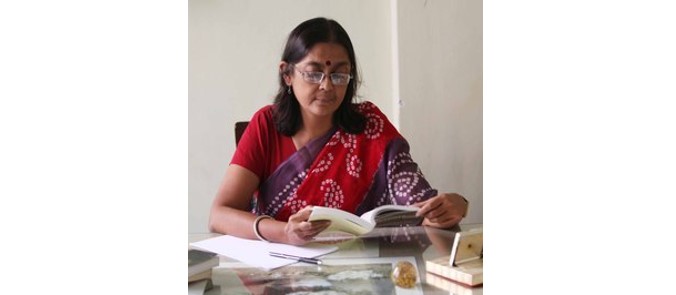by Surabhi Agarwal
Shoma Sen was arrested on June 6, 2018, under the Unlawful Activities (Prevention) Act for charges which include inciting violence, being involved in raising funds for the banned CPI (Maoist) party and harbouring its fugitive members.
Prof Sen is a highly vocal and committed women’s rights activist who has been involved with a wide range of social and political causes. She is a member of the Committee for the Protection of Democratic Rights (CPDR), an organisation which was set up in the wake of the Emergency with the objective of spreading awareness among people about their democratic rights under the Indian Constitution. She is the founding convener of the Committee Against Violence on Women (CAVW) and has participated in fact-finding missions on the implementation of the Armed Forces Special Powers Act (AFSPA) in Manipur and on the sexual violence perpetrated by the Salwa Judum in Bastar, Chhattisgarh.
As a young college student in Mumbai Sen was part of the Vidyarthi Pragati Sanghatana (VPS) which was a students’ organisation working to support numerous students and workers movements in the region. Through them Sen became involved with the Mumbai textile workers’ strikes of the 1980s. After completing her BA from Elphinstone College in Mumbai, Sen moved to Nagpur where she did her MA and PhD in English Literature at the Rashtrasant Tukadoji Maharaj Nagpur University. Here she joined the organisation Stree Chetana which worked with survivors of domestic violence. She was a convener at the Adivasi Mahila Sammelan held in Ranchi in March 2007. She has also spent many years working with the women living in the slums of Juni Magalwari in Nagpur, helping them with their education and in accessing legal aid.
Sen is the former head of the Department of English at Nagpur University. She has also taught at the People’s Welfare Society (PWS) College in Indora, Nagpur and served as visiting faculty at the Mahatma Gandhi International Hindi University in Wardha. She also served as the president of the Nagpur University Teachers’ Association for many years.
Sen has made significant academic contributions to the fields of postcolonial studies and women’s studies. She has written extensively on women’s rights and caste oppression in India. Her academic writings have been published by journals such as the Economic and Political Weekly and the Journal of Commonwealth Literature. She was a participant at the Indian Association of Women’s Studies (IAWS) National Conference held in Wardha.
Sen is very popular among her students and is known for her kind and encouraging demeanour. As a teacher of English, she has always been acutely aware of the elitist and exclusionary character of the language in India. Her students describe how she went out of her way to make everyone in her class feel comfortable and confident, irrespective of how “well” they could speak. Her close engagement with issues of caste-based sexual violence and discrimination on the ground provided her with a critical lens through which to look at the writings of fellow Indian upper-caste feminists and critique the gaps in their understanding of the role of caste in the oppression of women.
Colleagues, friends and family members of Shoma Sen talk of how her commitment to social justice translates into extraordinary generosity and compassion in her day to day life. Sen chose to leave her birthplace and childhood home in Mumbai to settle in Nagpur because she wanted to escape her elite circles and work in a less developed region of her state. Her daughter Koel remembers how her mother always kept the doors of their home open for outsiders, often allowing young girls in need of financial and educational support to stay with them for months or years.
Prof Sen’s arrest came in the wake of the Bhima-Koregaon anti-Dalit violence that followed the Elgar Parishad conference in which Sen had participated. The police held the conference responsible for the violence, even though there are conclusive reports of how Hindutva leaders of the area such as Sambhaji Bhide and Milind Ekbote — who were upset by the assertion of solidarity by Dalit-Bahujan groups — had incited people to violence.
Sen was suspended from her position at Nagpur University and an enquiry against her was initiated by the university administration a few months after her arrest. It has been reported that the university was under pressure from the government to take action against her.
Sen first applied for bail in November 2018, but her plea was rejected by the court with the claim that there was evidence linking her to illegal, anti-national activities. However, none of this evidence has been made public. Recently Sen, who is now 61 years old, filed for bail again, stating that she was especially vulnerable to COVID-19 due to her history of health issues. The court again rejected the plea and said that she could not be granted bail only because she was suffering from “some disease”.
Two other political prisoners, Akhil Gogoi and Varavara Rao have tested positive for COVID-19, raising concerns about the extent of the transmission of the virus in Indian jails and the need to decongest them and improve living conditions in order to protect prisoners. Under such circumstances, the continued imprisonment of Shoma Sen, along with all other political prisoners who have been incarcerated merely for daring to express their dissent against the state, is indefensible and inhumane. Sen must be released and all charges against her dropped immediately.
Email: surabhiagwl@gmail.com













